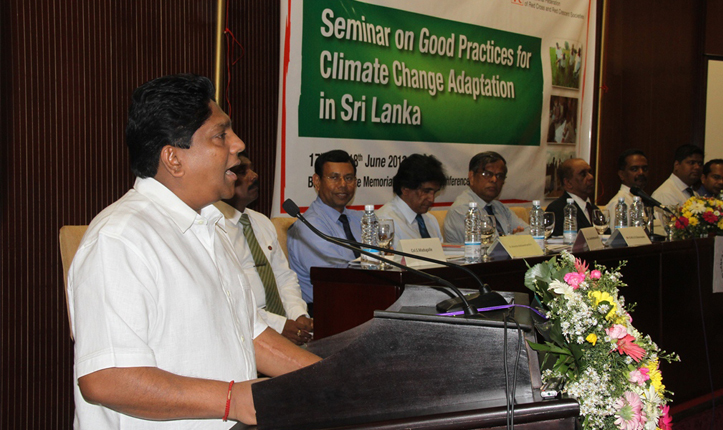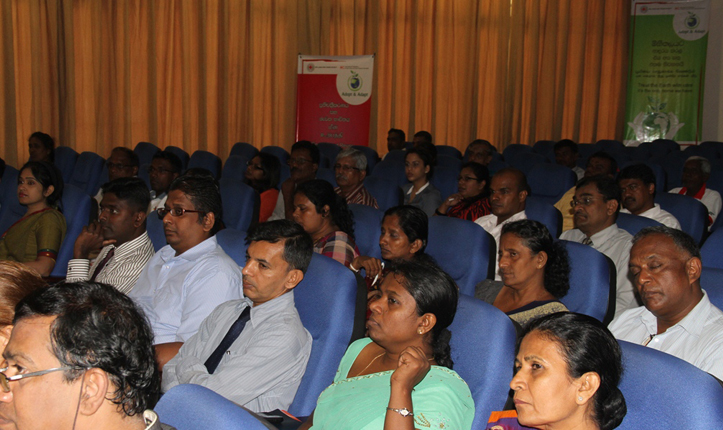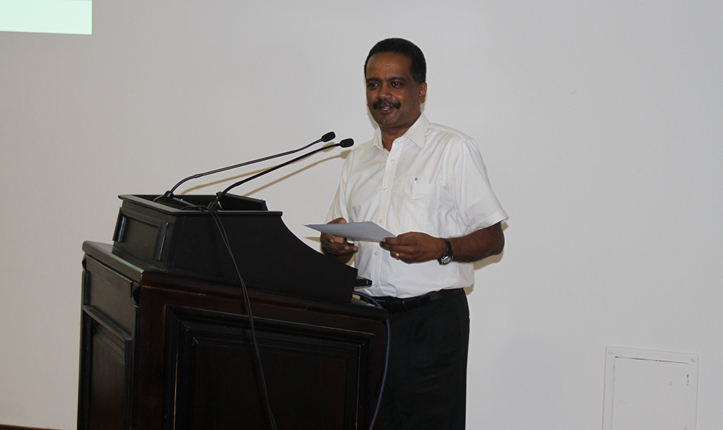Raising awareness on adaptation towards climate change
17/06/2013 – Colombo, Sri Lanka: The Sri Lanka Red Cross Society (SLRCS) along with the Disaster Management Centre of Sri Lanka, has held a workshop for the public on “Good Practices of Climate Change Adaptation” aiming to raise awareness on mitigation practices towards climate change.
This two-day workshop began at the Bandaranaike Memorial International Conference Hall in Colombo 07 today. The Director General of SLRCS Tissa Abeywickrama, graced the occasion as the Chief Guest of the event.
Addressing the gathering the Director General focused on the vulnerable communities in rural areas who are much more prone towards the effects of climate change.
He further reiterated that steps need to be taken to address these issues faced by them and the workshop of SLRCS is a right step towards that direction.
“Climate change harassments are no longer a choice to Sri Lankans either. If we have no choice because of the actions of Sri Lankans or due to actions of the world; how do we pinpoint those responsible? And we should voice our concern to those responsible loudly?”
This seminar, which brings the practitioners and policy makers together, will share and discuss the good practices and strategies for adapting to climate change.
It will help the participants to further develop their capacities and understanding on climate change and disaster risks reduction technologies which will facilitate sharing, replicating and possible scaling-up of these practices. .
The recommendations from the Seminar will be documented and disseminated to all levels with the intention of contributing to the ongoing National Adaptation Programme (NAP) process and strengthen community based adaptation (CBA) perspectives.
In addition, SLRCS will disseminate a report, which includes the proceedings and recommendations of the seminar, and strengthen the discussion for CBA.
Please find the full text of the speech made by the Director General of SLRCS presented at the inauguration of the event today.
Is Climate Change natural or man-made?
If it is natural; what can we do to minimize its detrimental impacts?
If it is man-made; who are responsible to stop environmental destructions?
We know prevention is better than cure, so for climate change, what should our good practices aimed to be? To adapt or to mitigate? I request you to be rational in your individual and institutional approach and be loud about it.
We know that detrimental impacts of climate change are devastating every country. Therefore, not only global policies, but result oriented mitigation action should precede adaptation endeavors.
The recent storm in Sri Lanka made turmoil to fishery communities. What is the adaptation mechanism for them? Is informing them to wear a life jacket the answer? What more can we tell them? I ask you to think.
Aren’t we proud of our ancient irrigation system? Hasn’t it benefited us? One of our Great leaders; King Parakrama Bahu the Great, said “even a drop of rain, fall on ground should not go to the ocean without benefiting man”, by this, was he also instrumenting a mitigating strategy for natural hazards? Flash floods we experience in Sri Lanka now, can it be only due to the magnitude of rain? If it is not so, what is the reason? Is it due to unsystematic use of land for development?
Today, there are discrepancies in scientific prediction on weather and climate; does it mean we don’t have a predicting capability? Recently a Tornedo had devastated Oklahoma area in USA. I heard it had come in complete surprise, even to meteorological experts.
In my recent travel to cities in the region, I have seen the sky is covered with dark fog, I am told it is due to vehicle and industrial exhaust fumes. Believe me sunlight seems to be a privilege to those city inmates. Could Colombo turn into that unless we do something?
Our urban and rural communities are becoming increasingly vulnerable to various effects of climate change and these effects are adversely affecting our community’s socio economic state; in livelihood, shelter and heath interruptions.
Therefore just like many other nations, climate change harassments are no longer a choice to Sri Lankans either. If we have no choice because of the actions of Sri Lankans or due to actions of the world; how do we pinpoint those responsible? And we should voice our concern to those responsible loudly?
Nevertheless initiatives to curb this menace should be integrative. Not only you; I too have a duty. Recently I planted large number of trees in my own land. However like me and you, Sri Lanka Red Cross or any other organization’s individual contribution is inadequate to address this serious issue. Therefore everyone have to do it to be effective!
We know the law of nature; change is inevitable. The Greek philosopher “Heraclitus” said “there is nothing permanent except change”. However, we should work to stop man-made detrimental impacts to the environment.
Therefore, it is our responsibility to make this a duty of all.
Thank you.


